Kevin Clarke
Operetta Research Center
19 July, 2014
Dutch baritone Peter Bording studied singing with Jan Handerson, graduated from the Sweelinck Conservatorium Amsterdam and concluded his studies at the Guildhall School of Music and Drama, London. His extensive repertoire includes over 75 roles and spans all forms of musical theatre, including operetta. We caught up with Peter just before he went on holiday for the summer, to speak with him about the operetta situation in the Netherlands – and why he enjoys singing a genrethat has the worst possible image in his homeland.
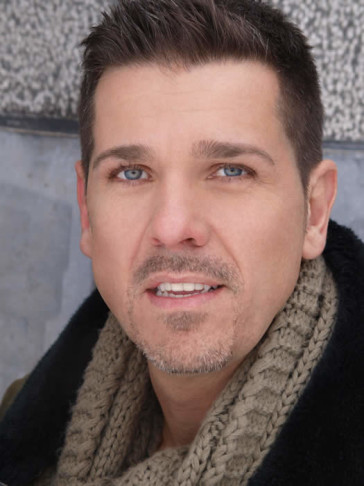
Baritone Peter Bording, in a publicity shot. (Photo: Gerard de Haan)
You come from a Dutch family of operetta singers. How has “operetta,” as a genre embedded in the cultural landscape, changed over the last decades in the Netherlands?
I would say it has changed out of all recognition. Operetta has all but disappeared from Dutch stages, be it professional or those of the once thriving amateur landscape.
One particularity of the Dutch operetta scene is that only amateur groups play operetta. Is what you see as “operetta” in the Netherlands today really representative of the art form?
Not in the least. And that is hardly surprising as there is nothing to aspire to by way of a professional guidelines. And, in any case, even the amateur groups tend to lean more and more towards musicals instead of operettas.
As far back as the 1920s – when the up-to-date theaters in Berlin and Vienna presented jazzy and decidedly modern operettas – the Dutch public preferred old-fashioned Viennese titles that the Fritz Hirsch Co. performed. Why do you think the Dutch were not interested in ‘contemporary’ operetta, but more in the nostalgia side of the genre?
I don’t think it was so much the Dutch audiences that weren’t interested, but more a result of the choices made by the direction of the Fritz Hirsch Operette. It was a private company, which needed to sell tickets for its livelihood and therefore hung onto the big titles.
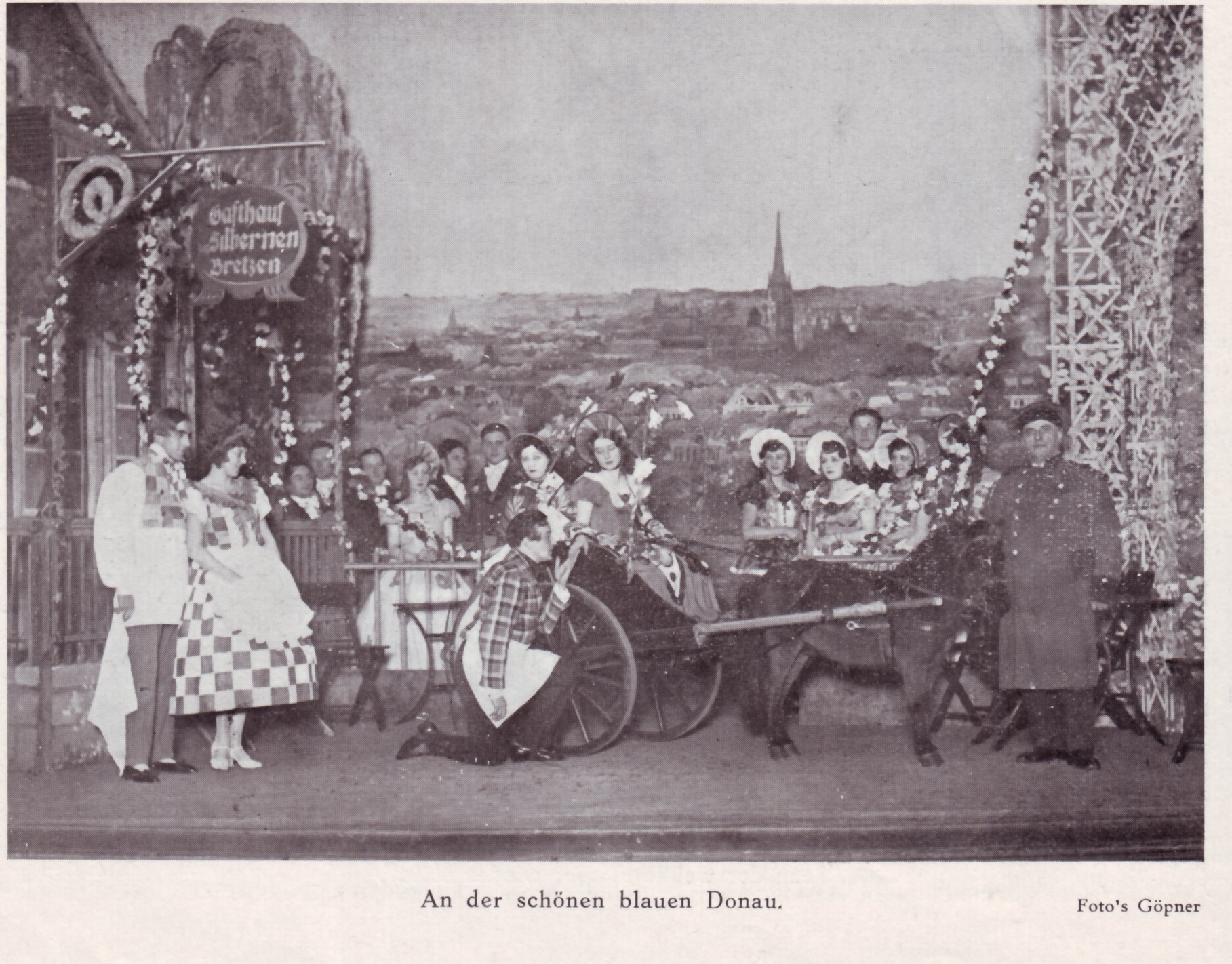
Scene from the Fritz Hirsch production Fritz Hirsch “An der schönen blauen Donau” in the 1930s.
Much the same goes for the Hoofdstad Operette, which started out as a self-supporting company. When it eventually came to be governmentally subsidized, the awarded subsidies were very much dependant on the amount of tickets sold. Operetta was regarded by the state (or those that advised it) as entertainment for elderly people with small wallets – not as an art form. The stretch of the guilders spent was measured in audiences reached, not by artistic values met. When that changed, the company was not able to make that U-turn.
There was basically a circle of 10 titles that was repeated every 10 years, much as we see with the recurrence of musical shows like the Sound of Music, Annie or Grease nowadays. It must be said however that operettas like Viktoria und ihr Husar, Im weissen Rössl and In einer kleinen Konditorei were indeed part of that “iron repertoire”.
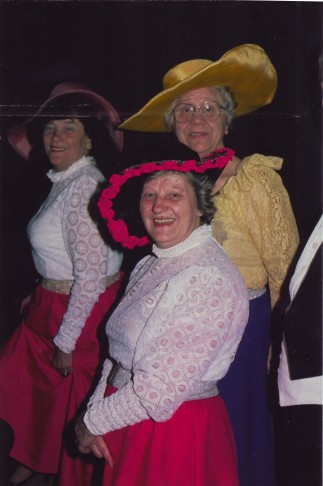
Photo from the Dutch magazine “Vrij Nederland” showing an typical amateur society perforance of “Csárdásfürstin,” 1984.
That the operetta lovers and audiences were open to much more than “just” Strauss, Lehar & Co. is proven by the much broader repertoire of the abundance of amateur companies (its countless members and followers making up for a very large part of the audience). When I grew up, a city like Amsterdam boasted no less than 10 such societies, all of very differing background and quality, all performing two productions per year. By the time I reached 16, I had seen pieces like Grigri, Der arme Jonathan, Die goldene Meisterin, Balkanliebe, Die ungarische Hochzeit, Clivia, Manina, Polenblut, Die Rose von Stambul, Madame Pompadour, Maske in Blau, Hochzeitsnacht im Paradies, Schwarzwaldmädel, Die Blume von Hawaii, The Desert Song, The Student Prince, Naughty Marietta, No No Nanette, Rose Marie, The Dancing Years, The Geisha, Les cloches de Corneville, virtually all of the G&S Savoy operas and the majority of the Offenbachs. (But no Fledermaus!)
Hardly any of those titles ever got a professional staging in the Netherlands but it is quite obvious that there would have been a market for it.
In Germany and Austria, there is a rekindled interest in the “origins” of operetta, the jazzy titles that were swept away after 1933, but also an interest in the kinky side of Paris operetta à la Offenbach. Do you see any such interest in the Netherlands?
There is no doubt in my mind that any well-produced operetta production be it jazzy, kinky, classical or avant-garde, will fill theatres to the brim. Interest is created by offer. I don’t think the Berlin audiences asked for Ball im Savoy. They were offered it and then came running!
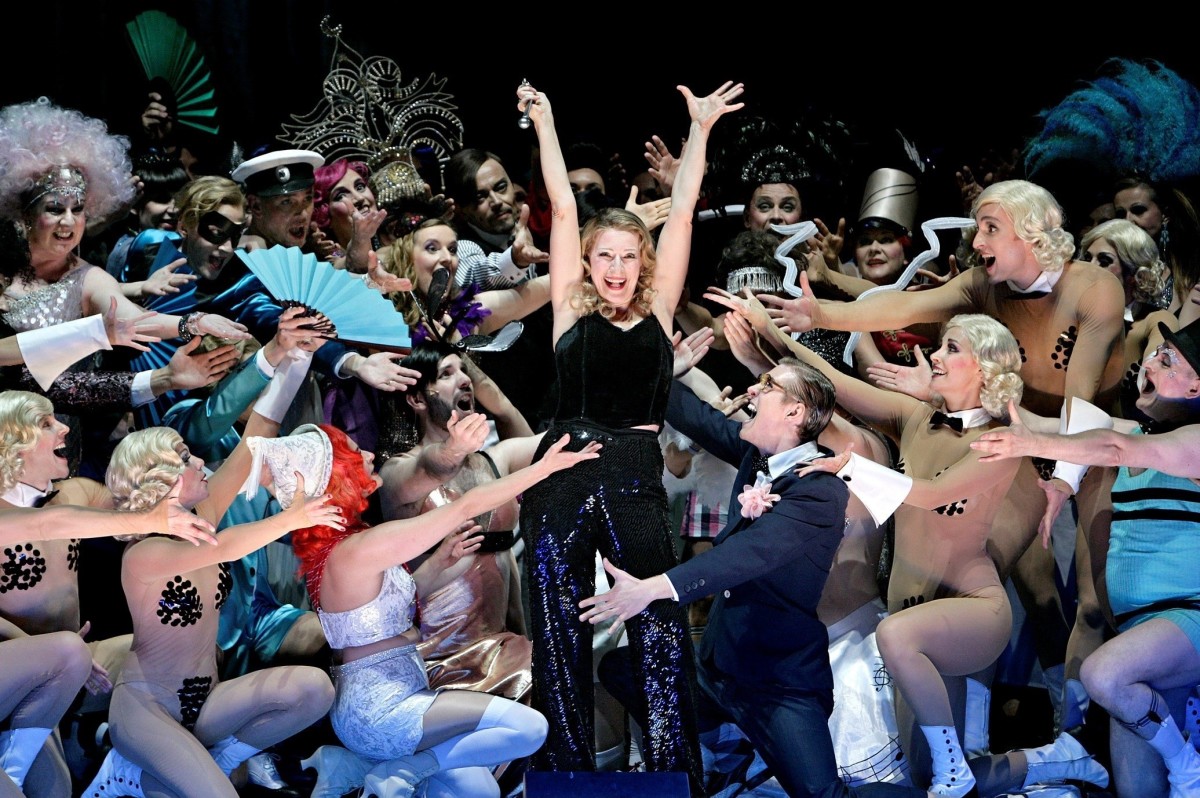
Dagmar Manzel in “Ball im Savoy”, Komische Oper Berlin. (Photo: Iko Freese/Drama Berlin/Komische Oper)
Again, it is not the audiences that caused the flat line of operetta in the Netherlands – it was the government and the Intendants that brought that on, be it by choice or incompetence. The only fear I have is that the longer we wait, the more difficult a revival will get. Nobody grows up with operetta music any more and the “old fashioned” label still seems to stick.
On the optimistic side, it must be said that Radio4 seems to have jumped on the bandwagon and offers at least a small taste of operetta music on a daily basis now.
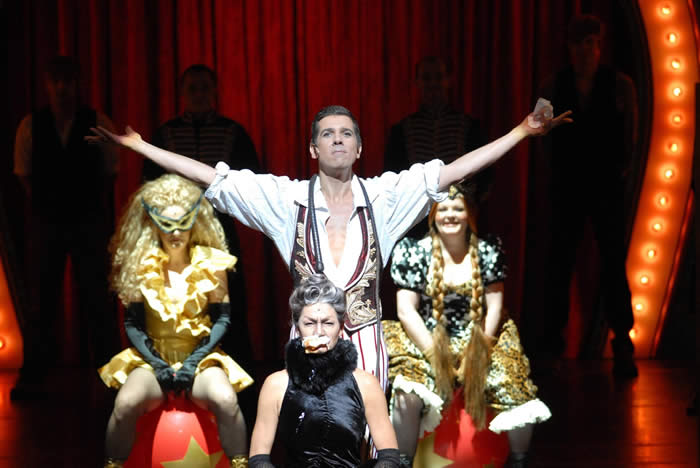
Peter Bording in a production of “Feuerwerk” in Essen, Aalto Theater 2007.
This year I conducted a series of masterclasses on operetta for the junior students at the Utrecht Conservatorium – the singers of tomorrow. I asked them to prepare two pieces, one from the “Goldene” or “Silberne” Wiener Ära and one from either the Berlin, Savoy, Offenbach, American or any other period or origin. What surprised me is that the students came up with a very wide variety of pieces and hardly needed any convincing towards the genre. They put in loads of energy and it was obvious they had fun with it.
It seems that this generation, which grew up without “Anneliese Rothenberger gibt sich die Ehre”, the Hoofdstad Operette or Ein Abend in Wien, is not hampered by the “stuffy” label operetta is so often laden with. That surely must be a reason for optimism!
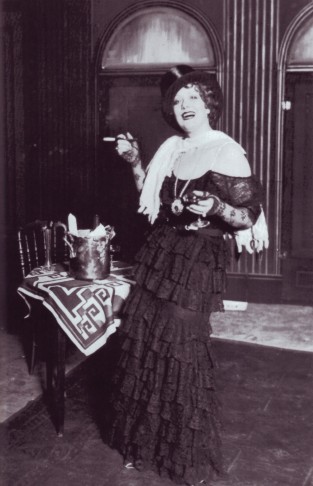
Dutch diva Beppie de Vries in “Die Blume von Hawaii”, in the early 1930s.
There have been big operetta exhibitions in Berlin, Vienna and Munich recently, at the local Theatermuseum and at the Schwule Museum, which had an Erik Charell exhibition. Why is the Theaterinstituut Nederland not doing something similar – when, obviously, operetta was an important part of the Dutch theater tradition?
Excellent question! I wish I could answer it. It certainly would be a start.
In your own career: What changes in the performance style of operetta have you noticed? Do you talk about the changes with your parents?
My father was a master in the vocal style of the ‘30s and ‘40s, an art form which has all but disappeared in the Netherlands (and indeed beyond) and a wonderful actor. My mother came from the operatic side of the spectrum and was a true Operettendiva of the post-war mold, coming from a long line of excellent singers. My father has left this plane some 25 years ago now but my mother still very much enjoys going to the theatre. We talk a lot about stagings and styles. I never detected nostalgia for the old days – Art is Art and is ever evolving. But we do detect a loss of “vocabulary” – the many different styles within the genre.
Growing up, I heard the sumptuous sound of the 70’s recordings but also the historic interpretations from the earlier decades.
Contrary to my parents, I am very much a child of the Regietheater era – Operetta wasn’t exempt from that practice, for good or for bad.
Nowadays operettas are tackled by directors in the same way that they treat an opera. That can work very well (for the more romantic works) but often overshoots the goal (or better, falls short of it). Operetta is a very theatrical genre – arguably the most theatrical of all musical theatre genres. It encompasses revue, dance, dialogue, classical as well as jazz, cabaret and chansoniere styles of singing, rapid scene changes, mass choreography etc. etc. etc. – basically it is Entertainment with all the craftsmanship of the classical theatrical Arts. Not recognizing this difference and producing it the same way an opera house produces an opera, is a mistake.
There is a renewed interest in recordings by historic operetta singers such as Fritzi Massary, Oscar Denes, Alexander Girardi etc. Do you think contemporary operetta singers such as yourself can learn something from these stars of the past?
But of course! We all stand on the shoulders of those that came before us and you can’t evolve if you don’t know where you came from. Theatre is based on tradition. And even those who seek new ways or deliberately want to go against tradition have to know what they are going against.
The singers you named are quintessential operetta singers. They owned a style that was inherent to the art form, which was in its heyday much like musical theatre is now. Every singer who ventures into operetta and takes it seriously should take note, if only to discover what has changed for good and what was sadly lost.
I think it is safe to assume that there are no singers today that identify themselves purely as operetta singers. One doesn’t specialize in a specialism that is past its golden era, has no real present and has an unsure future. We are opera singers, musical stars, cabaret artists, singing dancers, actors or chansoniers who “do” operetta. This is hardly surprising considering that no new operettas are being composed and those works that do still get performed are of a limited repertoire. Consequently, I think that those who do care for the genre should prepare even better and make sure it gets passed on to future generations.
You will sing Eisenstein in Die Fledermaus at the Komische Oper in Berlin soon. It’s a very sexually liberated character in a very sexually liberated show. How do you handle such an operetta character in our “Pornographic Age”? Is Fledermaus more modern than many think? Or do you consciously evade the sexual innuendo the original show would allow for?
Viennese operetta always has an element of sexual liberty. Too much so for Victorian England even, which resorted to Gilbert & Sullivan to give them something a little less risqué.
Besides the fact that it is a masterpiece, Die Fledermaus is relevant to this day. It is set in the middle classes. We can’t relate to Greek Gods, Viennese aristocracy or the English tongue in cheek take on Japanese court rituals. We can only be entertained by them but we can relate to the middle class, since almost all of us nowadays belong to it.
And Fledermaus is even more current in times of financial and social crises. To me, there is not much difference between the sexual decadence of the ball at Orlofsky’s or a fetish party at Paradiso or Berghain.
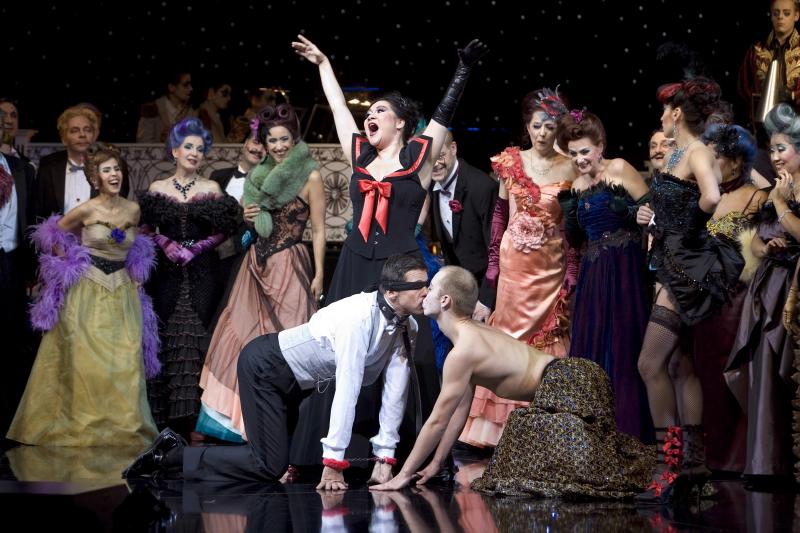
Peter Bording in the party scene from “Die Fledermaus”, Aalto Theater Essen, 2011.
So the question is not so much whether Fledermaus is more modern than many think, but whether we have progressed as far as we tend to assume we have. My guess is no. As a result I don’t find it difficult to relate to a character like Eisenstein. It certainly is closer to home than, say, a murderous Macbeth (if that were my Fach).
As for evading innuendo – that really is up to the director. As an actor, I cannot portray “the bigger picture”, I can only play my part in it. And I am open for any story the director wants me to tell. That is my job.
What are the operetta roles you would like to sing?
I have the good fortune that the leads in the most played operettas – Die Fledermaus, Die lustige Witwe and Die Csárdásfürstin – are at the very heart of my repertoire. My voice and appearance seem to fit these roles in todays Aufführungspraxis. I am lucky in that way and happy because of it. They are all gems composed by geniuses. But there is much more to discover and so many more roles I would love to portray. Abraham, Romberg, Frimml, the American Kálmáns – you name them. In choosing them, I only feel limited by the limits of my instrument and suitability of my temperament, not by the style of music. Much like Mozart requires a different approach than Puccini, so differs Lehár from Benatzky. The technique is the same, the style varies.
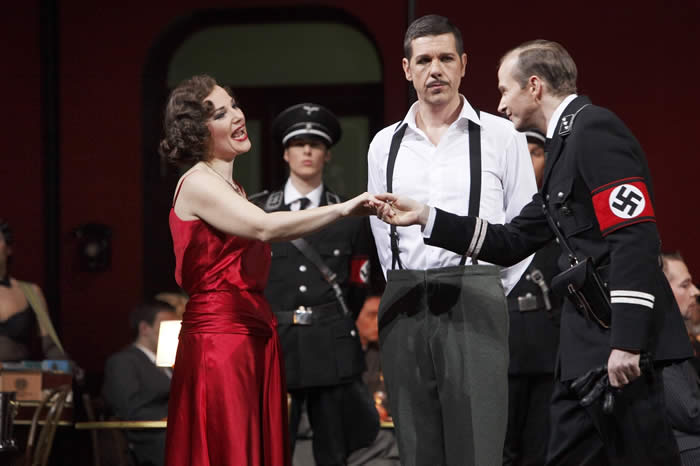
Peter Bording as Edwin, in a “Nazi” version of “Die Csárdásfürstin” in Essen, Aalto Theater 2010.
Today, the Netherlands present themselves as a very modern, very hip and very open-minded country. If operetta are to have a chance with current audiences there, which titles do you suggest to be performed and by who? Do we need to free operetta from the amateurs in NL? And from the old-fashioned opera people? And give them to Stage Entertainment or the good looking pop music scene?
We most certainly should not free operetta from anyone who has a love for it. That is the soil we need for its flourishing! I welcome any initiative to produce good operetta from any era. But maybe venturing away from the titles that live in our minds as “the epitome of operetta” is a good idea.
Stage Entertainment has the recourses, opera companies have the utilities, amateurs have the love.
I feel a combination of all three is essential for any theatrical landscape to bloom. I am not sure how the pop scene might fit in – that is the music of a later era and I must confess I have a problem with (over-)amplification. Good looks are a matter of taste and, I am sure, to be found in musicians of any genre. But I do concur that a leading man needs to look the part and that a soubrette needs more than just the right voice.
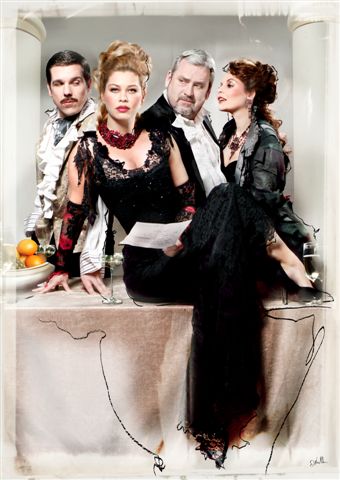
Peter Bording in a Dutch production of “La Vie Parisienne” in 2006, cast with musical stars from the Stage Entertainment universe.
I feel that relying on any one production company for the survival of the genre in the Netherlands has proven to be a dead end street in the past. In France, it is the opera companies that keep Offenbach on stage to great critical and public acclaim.
In Britain, G&S never left and is in firm hands of excellent amateur societies. In Germany, operetta sells out wherever it is performed in productions good and bad, by opera houses, the few operetta theatres left or private endeavors. In Austria, operetta lives on in the very soul of the entire nation and not just in the capital.
Anachronistically, to rekindle a genre from a past century, which has long proven both its commercial, artistic and commercially artistic value, we now actually need a pioneer – a pioneer with the will, passion and conviction to put these gems where they belong – on the stage!
All images from Komische Oper Berlin and the Fledermaus production at Aalto Theater Essen are by Iko Freese, www.drama-berlin.de (Agentur für Theaterfotos).

Mooi en goed interview Peter. Mooie foto’s ook. Fijn dat je zoveel Operette zingt in Duitsland. Jammer dat Nederland toch niet meer zo Operette-minded is zoals dat vroeger het geval was. Ben in elk geval wel blij een aantal jaren deel uitgemaakt te hebben van het dubbelkwartet en later het koor van de Hoofdstad Operette. Zwei Herzen im Dreivierteltakt, Die lustige Witwe en Gräfin Mariza. En ruim 7 jaar voorzitter te zijn geweest van de Verenigen Vrienden van de Hoofdstad Operette.Mooie herinneringen daaraan.
Een mooi interview met een zanger die zijn vak buitengewoon goed verstaat en gelukkig ook weer in Nederland te zien was. Hopelijk gaat dat vaker gebeuren. Peter vertelt mooi over zijn ouders en met zijn vader, ook een groot vakman, heb ik lang geleden bij de Nederlanse opera nog gewerkt. Bording analyseert helder waarom de professionele operette in Nederland is verdwenen maar noemt daarbij nauwelijks dat de Nederlandse operaopleidingen Operette vrijwel negeren. Zijn masterclass in Utrecht was een witte raaf en ik zie geen structurele veranderingen op dit terrein. Een masterclass operette ( binnenkort ook bij het IVC) is een druppel op een gloeiende plaat. Operette vraagt om zangers die kunnen zingen, spelen, dialoog beheersen, dansen en dat allemaal tegelijk. Daarvan is Peter Bording een goed voorbeeld. Maar die kunst moet je eerst leren op school en vervolgens op het toneel. Dan is 1 productie niet genoeg, maar moet er jaren worden geleerd. Dat zie ik in Nederland niet gebeuren. Dus wie goede operette waardeert moet op reis: naar Duitsland of Oostenrijk. Of Engeland voor Gilbert& Sullivan.
Zo recht uit het hart en zo helemaal jij. Wij hebben de glorietijd van de amateuroperette meegemaakt en jij bent daar torenhoog bovenuit gegroeid. Ik vind het een eer met jou en je moeder operette gespeeld te hebben. Je weet dat mijn vader en moeder in Carré hebben gespeeld bij de operette van Johan Boskamp. Dat waren heel vaak Franse operettes waar Boskamp nog een Franse onderscheiding voor heeft gekregen. Ik probeer bij RTV Diemen met 1 uurtje per 2 weken operette levend te houden maar ik ben bang dat het roeien tegen de stroom in is. Jij zou een geweldige ambassadeur zijn in Nederland voor de kunstvorm operette. Wie moet die stuk lezen???
and what a sexy guy he is – yummie….
I had forgotten that Peter was in Czardasfurstin at Essen – he was rather good. Great photo – he looks so young 7 years ago!!!
Zie eindelijk mijn neef, in de voetsporen van mijn oom Jan.
Wat een prachtige stem.
Je vader zou trots op je zijn Peter.